

Ways To Differentiate Instruction - Classroom Q&A With Larry Ferlazzo. (This is the first post in a two-part series on differentiation) I posed this question last week: "What is the best advice you can give to a teacher about differentiating instruction?
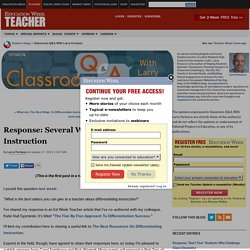
" I've shared my response in an Ed Week Teacher article that I've co-authored with my colleague, Katie Hull Sypnieski. It's titled "The Five By Five Approach To Differentiation Success. " I'll limit my contribution here to sharing a useful link to The Best Resources On Differentiating Instruction. Experts in the field, though, have agreed to share their responses here, so today I'm pleased to publish answers from Carol Tomlinson and Rick Wormeli. Response From Carol Tomlinson Carol Tomlinson is an internationally-recognized leader and author in the field of differentiated instruction. My journey with differentiation began in my middle school classroom when it was quite clear that my one-size-fits-all approach to teaching was, in fact, not fitting many of my students.
There were many more questions, of course. Academically and Intellectually Gifted Students. Teaching the Gifted and Talented: 33 Websites Where You Can Find Good Resources. I wish the Internet was available to me as a kid in elementary school.
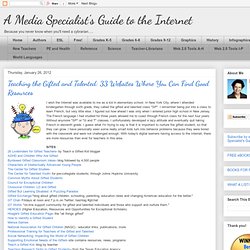
In New York City, where I attended kindergarten through sixth grade, they called the gifted and talented class "SP". I remember being put into a class to learn French, but very little else. I figured out how ahead I was only when I entered junior high school in New Jersey. The French language I had studied for three years allowed me to coast through French class for the next four years.
Without anymore "SP" or "G and T" classes, I unfortunately developed a lazy attitude and eventually quit taking French in eleventh grade. LESSON PLANS41 Ways to Go Beyond the Book Report Edsitement- from the National Endowment for the Humanities Gifted and Talented Education Lesson Plans Helpful Sites for Gifted Students Lesson Plan Resources- from Davidson GiftedMrs. Test Anxiety. Study Skills. Once you have established a schedule to study you need to get the most out of that time.
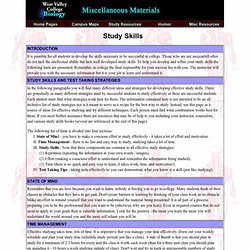
Several things will help increase your effectiveness. As already mentioned, maintaining a regular schedule is one. Another is creating a comfortable environment for studying that is free of distractions. Finally there is the What and How of studying. A. Generally all the material that you should know for an exam is presented in lecture or in your lab work. DO NOT take this to imply that you do not need to read the text. Note: Different instructors utilize textbook information to different degrees. If it is discussed in lecture it is important. There is no single "best" way to study.
The following is a compilation of many of the techniques used by successful students to study. 1. 2. Don't try to write everything that is said, just note enough to remind yourself what was discussed (your notes should be clear to you but not necessarily to anyone else). Learning Disabilities. Accommodations and Modifications. Accommodations, modifications, and alternative assessments may be necessary for a special needs child to succeed while working on materials for learning.
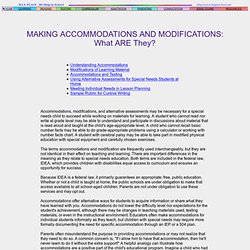
A student who cannot read nor write at grade level may be able to understand and participate in discussions about material that is read aloud and taught at the child's age-appropriate level. A child who cannot recall basic number facts may be able to do grade-appropriate problems using a calculator or working with number facts chart. A student with cerebral palsy may be able to take part in modified physical education with special equipment and carefully chosen exercises. The terms accommodations and modification are frequently used interchangeably, but they are not identical in their effect on teaching and learning. There are important differences in the meaning as they relate to special needs education. Because IDEA is a federal law, it primarily guarantees an appropriate, free, public education.
Understanding Accommodations. Response: Several Ways To Help Students Become Better Listeners - Classroom Q&A With Larry Ferlazzo. UserID: iCustID: IsLogged: false IsSiteLicense: false UserType: anonymous DisplayName: TrialsLeft: 0 Trials: Tier Preview Log: Exception pages ( /teachers/classroom_qa_with_larry_ferlazzo/2011/08/response_several_ways_to_help_students_become_better_listeners.html ) = NO Internal request ( 94.23.9.226 ) = NO Open House ( 2014-04-14 09:19:08 ) = NO Site Licence : ( 94.23.9.226 ) = NO ACL Free A vs U ( 2100 vs 0 ) = NO Token Free (NO TOKEN FOUND) = NO Blog authoring preview = NO Search Robot ( Firefox ) = NO.
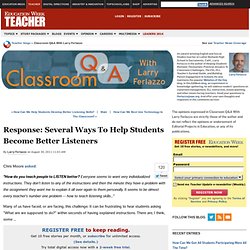
Study Guides and Strategies.